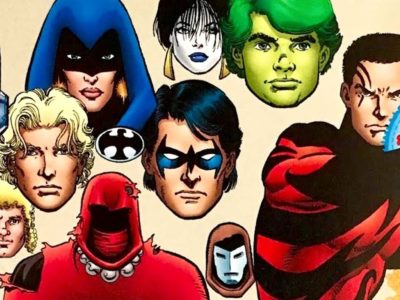
[ad_1]
Although Hardware is Milestone’s armor-wearing hero, he has key differences that set him apart from other armored heroes such as Marvel’s Iron Man.
Warning: The following article contains spoilers from Hardware #1, on sale now from DC Comics.
Curtis Metcalf, a scientific genius in the Milestone universe, became the superhero Hardware because he essentially had no other choice. While working as an inventor and weapons designer for Alva Industries, Metcalf was falsely accused of tampering with gas canisters that Alva sold to the police. After he was framed the authorities used lethal weapons on him, but Curtis was not going down without a fight.
Metcalf created a high-tech armor in his personal lab, which he used to become a mech-suited superhero. At first glance, Curtis might seem like a copy of characters such as Iron Man or War Machine, but there is a major difference that sets him apart from these other heroes.
Hardware: Season One #1 (by Brandon Thomas, Denys Cowan, Bill Sienkiewicz, and Chris Sotomayor) opens with the protagonist reflecting on one of his earliest memories in which he attended a protest with his father when he was just three years old. In fact, he describes this as one of his few happy memories with his father. His joy was due to the fact that he was too young to understand what was going on. Later, he would learn that the protest had been over the unjust killing of a Black child.
This was one of Curtis’s foundational memories. It also became a constant theme in his life, as time and time again he witnessed backlashes to similar killings, with one particular protest forever changing his life. The Big Bang occurred when Dakota PD released an experimental mutagenic gas against nonviolent demonstrators marching to oppose police brutality. The gas caused many to develop superpowers thanks to the tampering of Curtis’s employer, Edwin Alva, who then framed Metcalf for the disaster. With few option left, Curtis donned his high-tech battle armor and became Hardware to fight against militarized cops who were determined to kill rather than apprehend him.
Now, he is a man on the run, fighting back against the police as they hunt him down with every weapon at their disposal. The comic pulls no punches about its political message. The willingness of the authorities to gas peaceful protestors is simultaneously rooted in both modern-day US police practices and in the historic use of poison gas against minorities by fascist regimes. Curtis compares the police’s disregard for his life with the disregard given to the Black child murdered when he was three. Thankfully, his technology gives him the weapons necessary to fight back.
This highlights makes him different from other mech-suited superheroes, such as Tony Stark. while both heroes are geniuses who built weaponized armors to escape hostile enemies, Tony Stark was born rich, only to then make a lucrative living selling weapons to the US military. Similarly, his best friend Rhodey became War Machine after a life dedicated to military service. These two superheroes are intrinsically connected to the US military-industrial complex. Even DC’s Steel trusted in the systems of power, first working for LexCorp, then finding inspiration from Superman.
By contrast, Curtis Metcalf does not merely distrust the system, but is actively oppressed by it, being exploited from an early age. At ten, his science fair entry caught the attention of rich Edwin Alva, a billionaire industrialist who invested in Curtis’s education, not out of a sense of civic duty but so he could recruit Curtis to develop weapons and technology for Alva Industries. Curtis’s inventions “would literally change the course of human history,” according to Edwin Alva. However, the billionaire took all the credit for the inventions, reasoning that he was the one who recognized Curtis’s potential and funded his education.
This exemplifies a common trait in both white supremacy and predatory businesses in which those in power feel entitled to the profits gained from the work of others. If the exploited people complain, they are disparaged as being ungrateful. Alva admits as much openly, insisting that “[Curtis] asked for things he did not deserve.” The CEO’s sense of entitlement is so great that he betrayed Metcalf–the very man whose inventions were predicted to forever alter human history–setting him up to be killed by the police.
By becoming Hardware, Curtis proved he is the ultimate self-made man, willing to stand up for himself and his beliefs. For his entire life, he witnessed how the powerful oppress and exploit the less fortunate. Hardware is now willing to pit the power of his inventions against the people who mean to do him harm, and he is dedicated to bringing down his old boss, Edwin Alva, by any means necessary.
About The Author
[ad_2]






